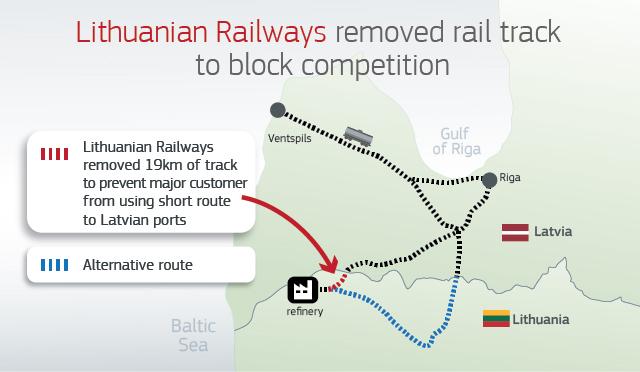Antitrust: Commission fines Lithuanian Railways €28 million for hindering competition on rail freight market
Commissioner Margrethe Vestager, in charge of competition policy said: “Lithuanian Railways used its control over the national rail infrastructure to penalise competitors in the rail transport sector. The European Union needs a well-functioning rail freight market. It is unacceptable and unprecedented that a company dismantles a public rail infrastructure to protect itself from competition.“
Lithuanian Railways is the incumbent state-owned rail company in Lithuania. The company is vertically integrated, meaning that it is responsible for both railway infrastructure and rail transport.
AB Orlen Lietuva (“Orlen”) is a fully owned subsidiary of PKN Orlen, a Polish oil company.
In 2008, Orlen, a major commercial customer of Lithuanian Railways, considered redirecting its freight from Lithuania to Latvia by using the services of another rail operator. In October 2008, Lithuanian Railways dismantled a 19km long section of track connecting Lithuania and Latvia, close to Orlen’s refinery. The removal of the track meant that Orlen would need to use a much longer route to reach Latvia. Since then the dismantled track has not been rebuilt.

The Commission’s investigation found that these actions hindered competition on the rail freight market by preventing a major customer of Lithuanian Railways from using the services of another rail operator. Lithuanian Railways failed to show any objective justification for the removal of the track. Such behaviour is in breach of Article 102 of the Treaty on the Functioning of the European Union (TFEU) which prohibits the abuse of a dominant market position.
The EU’s rail freight market was liberalised in 2007. Since then, the Commission has been working to complete the single market for rail services, including by ensuring the independent management of rail infrastructure and fostering investment in tracks that interconnect Member States. In this context, the enforcement of EU competition rules is important to ensure that regulatory barriers are not replaced by anti-competitive behaviour of dominant rail companies that would prevent the EU from achieving its ultimate goals for rail transport.
Fines
The fines were set on the basis of the Commission’s 2006 Guidelines on fines (see press release and MEMO). Regarding the level of the fine, the Commission took into account, in particular, the value of sales relating to the infringement, the gravity of the infringement and its duration.
In addition to imposing a fine, the Commission’s Decision requires Lithuanian Railways to bring the infringement to an end and refrain from any measure that has the same or an equivalent object or effect.
Background
Article 102 of the Treaty on the Functioning of the European Union (TFEU) prohibits the abuse of a dominant market position which may affect trade between EU Member States and prevent or restrict competition. The Antitrust Regulation (Council Regulation No 1/2003) sets out how the Commission and the national competition authorities apply this provision.
Following a complaint by Orlen, the Commission carried out inspections at the premises of Lietuvos geležinkeliai in 2011 and opened formal antitrust proceedings in March 2013. The Commission sent Statement of Objections to the company in January 2015.
More information will be made available under the case number 39813 in the public case register on the Commission’s competition website once any confidentiality issues have been resolved. A periodic compilation of antitrust news is available in the Competition Weekly News Summary.
Action for damages
Any person or firm affected by anti-competitive behaviour as described in this case may bring the matter before the courts of the Member States and seek damages. The case law of the Court and Council Regulation 1/2003 both confirm that in cases before national courts, a Commission decision constitutes binding proof that the behaviour took place and was illegal. Even though the Commission has fined the companies concerned, damages may be awarded without being reduced on account of the Commission fine.
The Antitrust Damages Directive, which Member States had to implement in their legal systems by 27 December 2016, makes it easier for victims of anti-competitive practices to obtain damages. More information on antitrust damages actions, including a practical guide on how to quantify antitrust harm, is available here.